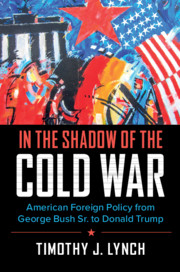2 results
Conclusion
-
- Book:
- In the Shadow of the Cold War
- Published online:
- 08 November 2019
- Print publication:
- 05 December 2019, pp 224-238
-
- Chapter
- Export citation

In the Shadow of the Cold War
- American Foreign Policy from George Bush Sr. to Donald Trump
-
- Published online:
- 08 November 2019
- Print publication:
- 05 December 2019

